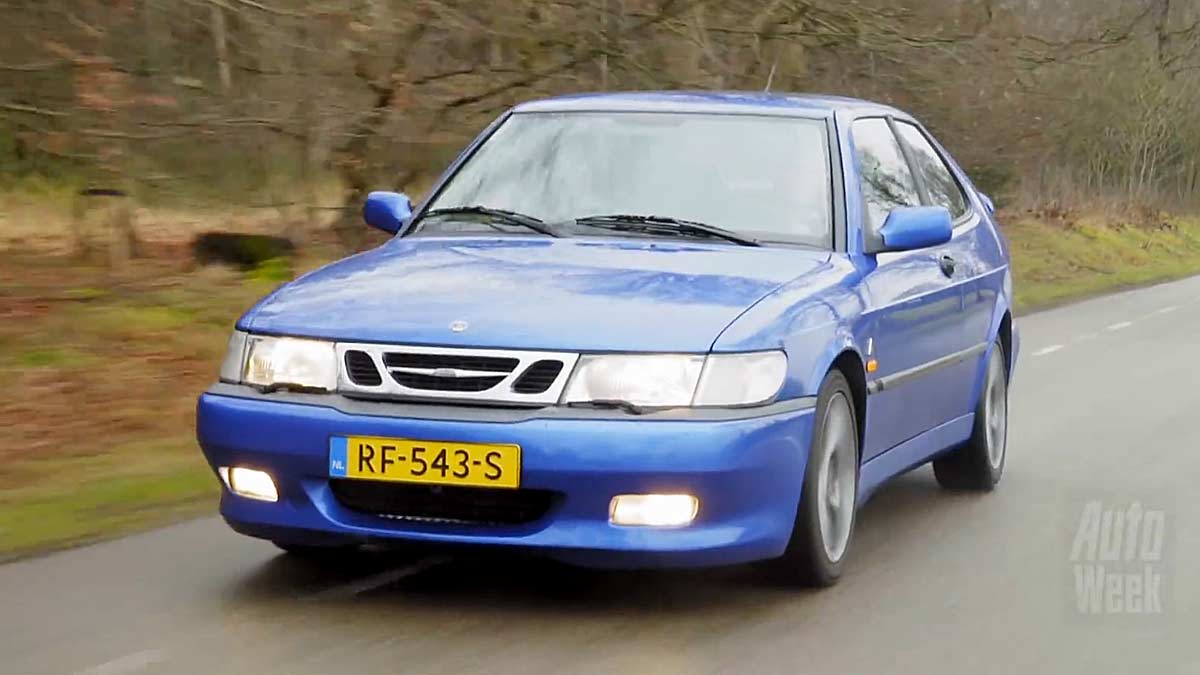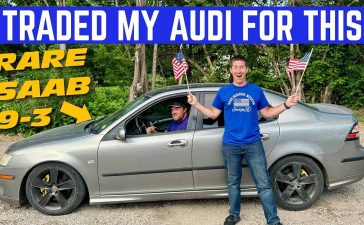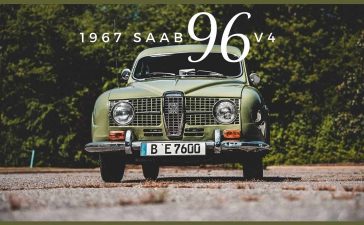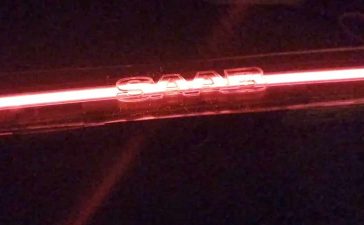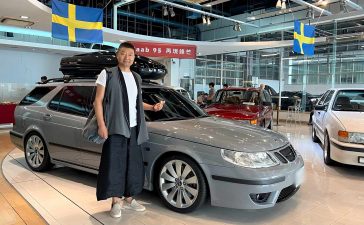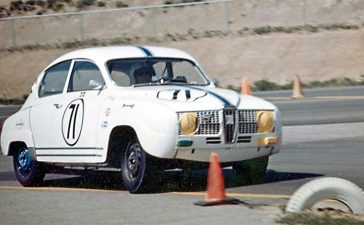When Safety Turned Into Obsession
The Saab addiction started not with horsepower but with fear. In 1986, Hallink – then a young farmer in Lemele- drove an Opel Kadett. That changed the moment he witnessed a horrific accident where a car was crushed under a truck. “I decided my family deserved something safer,” he recalls.
The answer was a Saab 900 Classic, purchased from a local dealer. That car didn’t just replace the Kadett; it rewired his automotive DNA. Over the years, Hallink’s collection grew from a humble Classic to dozens of Saabs, filling barns he redesigned as de facto exhibition halls.
Yet among his collection of 96 two-strokes, 900 Turbos, and NG 9-5s, one machine has a reputation unlike any other: the Viggen, Saab’s thunderbolt.
Viggen: Saab’s Wild Card
The Saab 9-3 Viggen, launched in 1999, was never meant to blend in. Developed with Tom Walkinshaw Racing (TWR), it was armed with a 2.3-liter turbo engine producing 225 horsepower and 342 Nm of torque. The power went unapologetically to the front wheels, resulting in legendary torque steer that could rip the wheel out of your hands.
Critics called it crude. Enthusiasts called it alive. Finished in its signature Lightning Blue, the Viggen was the last Saab to truly channel the brand’s aviation spirit before GM’s influence dulled the edges.
AutoWeek once described it as “a car with flaws you forgive because it refuses to be ordinary.” Hallink didn’t want perfection—he wanted that imperfection.

A Suspicious Listing on Mobile.de
The story of Hallink’s Viggen could have ended before it began. His son spotted an ad on Mobile.de: a Lightning Blue Viggen in Luxembourg, priced below market. That alone raised suspicion.
Then came the details: the car was originally delivered in England as a right-hand-drive. It was later converted in Lithuania to left-hand-drive using parts from a German donor car. To complicate matters, the seller was Lithuanian, operating from Luxembourg.
Most buyers would have walked away. Instead, Hallink requested proof: photos of Viggen-specific engine components, VIN confirmation, and under-hood details. Everything checked out. Against the odds, it was genuine.
A Deal Sealed With Coffee
What happened next speaks to the unique trust within the Saab community. The seller agreed to sign documents enabling Hallink to insure and legally drive the Viggen back to the Netherlands.
The two men shared coffee in Luxembourg before shaking hands. Then came the moment of truth: Hallink and his son guided the Viggen onto the German autobahn, cautiously keeping it at 120 km/h. No sudden drama, no failures – just the muted growl of Saab’s most rebellious engine.
It wasn’t until the car was safely back in Lemele that the flaws revealed themselves. One rear tire was worn down to canvas. The brake pads were metal-to-metal. “By Dutch standards, it was unsafe,” Hallink admits. “But the bones were good.”
Restoring Trust, Restoring Brakes
The Viggen went straight onto a lift in Hallink’s workshop. A full brake overhaul followed – calipers, pads, lines – along with fresh suspension components and proper tires. Only then was the car truly roadworthy.
“I don’t mind that it needed work,” Hallink says. “That’s part of the process. Now I know exactly what I have under me.”
It’s this hands-on approach that separates Hallink from collectors who buy turnkey museum pieces. For him, the story and the labor are as important as the finished product.
A Winter Driver, Not a Garage Queen
Unlike most Viggen owners, Hallink doesn’t hide his car under a cover. He drives it in Dutch winters, salt and all.
“It doesn’t get winter tires,” he says. “That would look wrong. I simply drive carefully. When I want to, I unleash the turbo. When I don’t, it behaves like any Saab – practical, comfortable, safe.”
That duality is the Viggen’s secret weapon. It can be brutal one moment, civilized the next. In Hallink’s words: “It’s ideal for winter—not because it’s the best handling car, but because it has courage.”
A Collector’s Museum, a Living Saab
Hallink’s barns are filled with Saabs in immaculate condition. Many are destined to become museum pieces, meticulously preserved. Yet the Viggen remains the odd one out—kept on the road.
“I will put it in the collection when it stops being practical,” he says. “Until then, it drives.”
This philosophy resonates with Saab’s ethos. The brand never built cars for display—they built them to endure harsh climates, demanding roads, and unconventional owners.
Why This Viggen Matters
AutoWeek called the Viggen a “fighter jet on wheels.” For Gerrit Jan Hallink, it’s more than that—it’s proof that Saab passion thrives not in garages but on roads.
The car’s journey – from England to Lithuania, to Luxembourg, and finally to rural Holland – is as unconventional as Saab itself. It’s a machine with scars, but also with character.
And unlike the BMWs or Audis of its era, the Viggen never chased perfection. It chased identity. That’s why enthusiasts forgive its flaws and celebrate its defiance.
Watch the Full Story on Video
If you want to see this Viggen in motion and hear Gerrit Jan Hallink tell the story himself, AutoWeek has produced an excellent video feature about his collection and this Lightning Blue coupe in particular. The video is in Dutch, but don’t let that stop you.
YouTube’s closed captions (CC) make it possible to follow along in your preferred language. Simply click the “CC” button at the bottom of the video player, then open the settings wheel and choose “Auto-translate” to select English—or any other language you prefer.
It’s worth watching, because Hallink’s enthusiasm and the way the Viggen roars to life on Dutch roads add a layer of authenticity that text alone can’t capture. Few videos show a Viggen being driven in winter with such honesty.
Watch the AutoWeek feature here:
Technical Data: Saab 9-3 Viggen Coupe (1999)
- Engine: 2.3L turbocharged inline-four
- Output: 225 hp / 342 Nm
- 0–100 km/h: 6.8 seconds
- Top speed: 250 km/h
- Transmission: 5-speed manual, FWD
- Color: Lightning Blue
- Weight: 1,395 kg
- Original MSRP (Europe): €48,834

